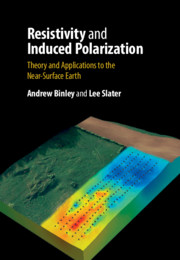Book contents
- Resistivity and Induced Polarization
- Reviews
- Resistivity and Induced Polarization
- Copyright page
- Contents
- Preface
- Acknowledgements
- Symbols
- 1 Introduction
- 2 Electrical Properties of the Near-Surface Earth
- 3 Instrumentation and Laboratory Measurements
- 4 Field-Scale Data Acquisition
- 5 Forward and Inverse Modelling
- 6 Case Studies
- 7 Future Developments
- Appendix A Modelling Tools
- References
- Index
- Plate Section (PDF Only)
6 - Case Studies
Published online by Cambridge University Press: 17 December 2020
- Resistivity and Induced Polarization
- Reviews
- Resistivity and Induced Polarization
- Copyright page
- Contents
- Preface
- Acknowledgements
- Symbols
- 1 Introduction
- 2 Electrical Properties of the Near-Surface Earth
- 3 Instrumentation and Laboratory Measurements
- 4 Field-Scale Data Acquisition
- 5 Forward and Inverse Modelling
- 6 Case Studies
- 7 Future Developments
- Appendix A Modelling Tools
- References
- Index
- Plate Section (PDF Only)
Summary
The sensitivity of electrical properties to the physical, chemical and, possibly, microbiological properties of the subsurface has motivated the application of resistivity and induced polarization measurements to image a remarkably diverse range of subsurface structures and processes. Traditional applications of the technologies have focused on static imaging of lithology, but time-lapse monitoring of fluid and solute transport processes in the earth is rapidly growing in popularity. Using a variety of laboratory and field-based case studies, we illustrate some of these applications of resistivity and IP measurements. Our selected case studies highlight some of the key concepts described in earlier chapters of the book, including handling of errors and choice of regularization methods when inverting resistivity and IP datasets. The selected case studies draw from a diverse range of fields, including geology, archaeology, hydrology, engineering and biology. We pay particular attention to recent case studies that illustrate the application of resistivity and IP measurements to issues of high societal relevance, including climate change, food security and environmental restoration.
- Type
- Chapter
- Information
- Resistivity and Induced PolarizationTheory and Applications to the Near-Surface Earth, pp. 275 - 320Publisher: Cambridge University PressPrint publication year: 2020

